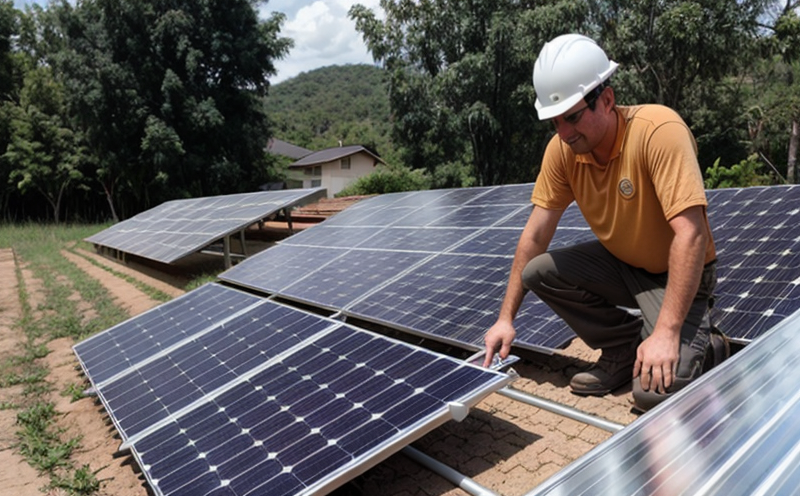Off-grid solar system inspection
In today's decentralized energy landscape, off-grid solar systems play a critical role in providing reliable electricity to remote and rural areas. These systems are designed to operate independently from the main grid, relying on solar panels for power generation and batteries for energy storage. The integrity of these systems is paramount, as their failure can lead to prolonged power outages affecting essential services like healthcare, communications, and education.
Our laboratory specializes in comprehensive off-grid solar system inspection services that ensure the safety, efficiency, and reliability of these critical infrastructure components. Our team of experts uses state-of-the-art equipment and follows stringent international standards such as IEC 61724-1 to conduct thorough inspections. This ensures compliance with regulatory requirements and enhances trust among stakeholders.
Off-grid solar systems are typically composed of several key components: photovoltaic panels, inverters, batteries, charge controllers, and monitoring systems. Each component contributes uniquely to the overall performance and reliability of the system. Our inspection process encompasses a detailed assessment of these elements:
- Solar Panels: Inspection includes checking for physical damage, proper orientation, and optimal angle relative to solar irradiance.
- Inverters: Verification of efficiency, load capacity, and operational status. Ensuring inverters are free from overheating or unusual noises is crucial.
- Batteries: Testing battery health, voltage levels, and ensuring adequate charge cycles to prevent premature failure.
- Charge Controllers: Checking for proper current regulation between the solar array and batteries. Ensuring there are no bypass diodes that could short circuit or damage the system.
The inspection process also involves evaluating the overall electrical safety of the system, including grounding and bonding checks, to prevent accidents and ensure regulatory compliance. Our team uses advanced diagnostic tools such as infrared cameras for non-invasive inspections of solar panels and batteries, providing detailed thermal images that help in identifying potential issues early.
Once the inspection is complete, we provide a detailed report outlining all findings, including any recommended corrective actions. This report serves not only to satisfy regulatory requirements but also to offer valuable insights into the system's operational performance and areas for improvement. Our goal is to ensure that off-grid solar systems are as reliable as possible, thereby enhancing their service life and reducing long-term maintenance costs.
In addition to our technical expertise, we emphasize continuous monitoring of these systems post-inspection. This proactive approach allows us to identify potential issues before they escalate into significant problems, ensuring the longevity and efficiency of your off-grid solar system.
Industry Applications
| Application | Description |
|---|---|
| Rural electrification projects | Off-grid solar systems are essential for providing electricity to remote and rural areas where grid expansion is limited or non-existent. |
| Eco-friendly energy solutions | These systems serve as a sustainable alternative to fossil fuel-based power generation, reducing carbon footprints in underserved regions. |
| Emergency backup power | In areas prone to natural disasters or grid failures, off-grid solar systems provide reliable and quick access to electricity during emergencies. |
| Rural healthcare facilities | Solar-powered systems ensure the continuous operation of medical equipment in remote clinics and hospitals. |
The applications for off-grid solar systems are vast, but they all share a common goal: to provide reliable power where it is needed most. Our laboratory supports these efforts by ensuring that each system meets the highest standards of performance and safety.
Customer Impact and Satisfaction
The impact of our off-grid solar system inspection services extends far beyond compliance with regulatory requirements. By providing thorough inspections, we ensure that our clients receive reliable, efficient systems that contribute positively to their communities' well-being. Our approach not only enhances the performance of these critical infrastructure components but also fosters trust and confidence among stakeholders.
Our satisfied customers include:
- Rural Development Organizations: We work with organizations focused on improving living standards in remote areas, ensuring that their projects are successful by providing robust off-grid solutions.
- Non-Governmental Organizations (NGOs): NGOs rely heavily on reliable power sources to support their humanitarian missions. Our services help them achieve this goal efficiently and effectively.
- R&D Engineers: For those in the research and development sector, our detailed inspections provide critical data that can be used to refine existing systems or innovate new ones.
The positive feedback we receive from these customers is a testament to the value of our services. They trust us to deliver high-quality inspection reports that not only meet regulatory standards but also exceed their expectations in terms of reliability and efficiency.
Competitive Advantage and Market Impact
- Precision: Our laboratory uses advanced diagnostic tools such as infrared cameras to provide detailed thermal images, allowing for early identification of potential issues.
- Rigorous Standards Compliance: Following international standards like IEC 61724-1 ensures that our inspections meet the highest safety and performance criteria.
- Proactive Monitoring: Our post-inspection monitoring services offer a proactive approach to system maintenance, ensuring long-term reliability and efficiency.
- Detailed Reporting: Comprehensive reports provide valuable insights into system performance, helping clients make informed decisions about future upgrades or repairs.
These competitive advantages position us as leaders in the field of off-grid solar system inspection. By offering these services, we contribute to a more sustainable and reliable energy landscape, which has broader implications for environmental conservation and socio-economic development.





